#danish vocabulary
Text
An assortment of more or less ridiculous Danish phrases to incorporate into your day-to-day life! (part the 2nd)
strømpesokker (noun, fk. pl.) – socksocks
Or stockingsocks, if you will. It's socks either way.
(hjemme)futter (noun, fk. pl.) – (home)choos
I literally had no idea how to translate this, but basically futter (fut in singular) are like slippers or any kind of cozy, comfortable shoes you'd wear indoors. I don't know why we sometimes call them that, but fut is also the sound a train makes. Thus: choos.
blamsefi (noun, fk.) – blasmephy
Blasphemy, but wrong because it sounds funnier like this
idyd (interj.) – indeed
This is what we in Danish tend to call an undersættelse (see below) of the English indeed. I 'in' and dyd 'virtue', but it kind of sounds like deed. Again, I don't know anyone who uses this except from my immediate family
undersætte (verb) – transearly (extremely not literally)
Allow me to explain: in Danish translate is oversætte (lit. over + set, likely a calque of Latin trādūcō via German übersetzen). When you underdo the act of oversætte, so when you translate something badly, especially if you do it too literally, you have not translated it – you have transearlied it (excuse my creative liberties here)
hils (verb, imperative) – tell them I said hello
You can use this in literally any situation when someone announces they are going anywhere at all. To Austria? Hils! Grandpa's uncle's dog's funeral? Hils! The restroom? Hils! (even better if it's not a public restroom).
However, this is traditionally used to tell someone to tell the person on the other end of a phone call hello from you
knep (interj.) – fuck (literally)
Literal translation of English fuck. This is considered extremely vulgar in the same way that I think fuck is to especially older speakers of English (?)
stande (verb, dialect) – refurb
An alternate way to say istandsætte (long, boring, standard Danish) in the dialect of the area of Jylland where I'm from (Salling). It means to fix, repair or refurbish
slo (adj., dialect) – stale
Literally means the same as stale, which (imo) doesn't have an actual word in standard Danish. Your crisps got old and soft? Slo. Bread old and dry? Slo. Straw wet and moldy? Slo. Soda lost all its fizz? Slo. Again, this is sallingbomål <3
goddawsbjerg (interj.) – g'day-hill
Say this when it is clear someone has not been following what has been said or has happened around them, kind of as to say "thrilled you decided to join us mentally as well as physically". As for the prevalence, I literally don't know anyone outside of my immediate family who uses this
idyllerisk (adj.) – idyllicish
Literally just idyllic but funnier
bajselademad (noun, fk.) – pinchocowich
Bajselademad is a portmanteau of the words bajer/bajser 'beer' (slang, so I used pint instead of beer) and chokoladelademad 'chocolate sandwich' (open faced, obviously). It literally just means a beer
puttesove (verb) – tucky-sleep
A sorta cutesy, joking way to say sleep. Putte is the word for tucking someone in, as well as just chilling in bed – with at least a blanket or duvet if not several in addition to pillows
diskodaskoluderbenzin (noun, uncountable) – disco dasco whore gasoline
Excuse the misogynistic overtones, but I just genuinely think this is a very funny was of describing low percentage vodka- or rum-basesd drinks (for example Bacardi Breezer)
kodyl (adj.) – aspirin
Kodyl means great or exaggerated, and you can also use it as an interjection kodylt! like you would use 'swell!', because it is pretty outdated. Kodyl was originally a brand of painkiller
hurtigkneppersko (noun, fk. pl.) – fast-fucker shoes
Expensive men's shoes, usually of some kind of skin, be it leather or snake. It implies the wearer of the shoes is a braggart with nothing to really brag about. This was added to the dictionary fairly recently, to the great amusement of many Danes
slam! (onomatopoeia) – whack!
An onomatopoetic word imitating the sound of being hit. Used not unlike the (now somewhat outdated) English "oooh, burn!" or just "ouch!" to indicate that something said to someone in your company was (perhaps unnecessarily) blunt, rude, or just shut them down really quickly – like a slap to the face
hjemmebragt (adj.) – home mrade
Or, more accurately, home brought. Most commonly used for baked goods (originating from hjemmebagt 'baked at home') that you intended to make yourself, but you just didn't have time, so you bought it at the corner store instead. Its use has, however, in my experience been extended to include most anything that """should've""" been homemade, but isn't
konge (adj.) – king
When something is really good, it's konge. Anything can be konge, from a chair to the meal your mother cooked you on your bi-annual visit at home.
brugsvildledning (noun, fk.) – user misleader · deceptions for use
A play on the word for 'user guide', brugsvejledning, swapping out the nominalised form of the verb vejlede 'guide, lead' for that of vildlede ' 'mislead, decive'
ork (noun, fk.) – bear
An ork is something that you just really cannot be bothered to do, because it would require some kind of effort. Doesn't matter how much effort, as it could be anything from getting your drink that you forgot in your kitchen, only realising this after you sat down, to explaining to your homophobic uncle why it's not acceptable to call gay people slurs, even if it is "just a joke". Most often, it is the former of those two scenarios
dak (noun, uncountable) – boom*
Short for dakkedak, which is an onomatopoetic name for music with a strong, repetitive bass rhythm.
*this is a bad translation, but it's the best I could come up with
gråssenollike (noun, fk.) – greyish feather-brain
A joke-y name for a house sparrow, gråspurv. Gråsse is presumed to either originate from plain gråspurv or gråsset 'grey-ish', and nollike is a word that can mean fool, but also be used about animals or women in jest.
skemad (noun, uncountable) – spoon food
Literally anything you can eat with a spoon. I believe its most common use is for the food you first give babies when they are moving on from nursing to real food, but I know quite a few people who use it for cereal because we literally only have the word “morgenmadsprodukter” for it, which is a mouthful to say.
#i present to you: part 2#yes i think my translation of gråssenollike is clever and funny thanks for asking#danish#danish language#dansk#dansk sprog#langblr#danish langblr#vocab list#danish vocabulary#original
60 notes
·
View notes
Text
A comparison of some basic vocabulary in Germanic languages 💙
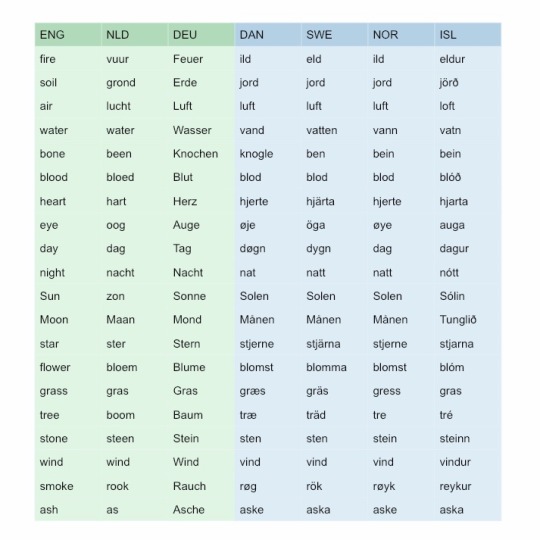
(left to right: English, Dutch, German, Danish, Swedish, Norwegian, Icelandic. West Germanic in green, North Germanic in blue.)
#language#linguistics#vocabulary#germanic languages#english#dutch#german#danish#swedish#norwegian#icelandic#fun facts#random facts#special interest
702 notes
·
View notes
Text
He's literally obsessed with kicking the ball at this kid in this fashion lately... show off..
Bonus of my favourite, precious dansk rotte:

#the way i learn words just to be able to use them when referring to this man..#also if that's not correct? i don't care 😤 come speak my language and find out it's not so fun either#anyway in totally unrelated news today i have that song from Barbie stuck in my head#you know that one that Billie wrote for it? the really depressing one?#yeah that one.. you don't understand the melancholy i'm living with besties..#meanwhile Kasper is posting about the beach on his stories while i'm out here rotting away#and it's sick and twisted because i KNOW he's about to hit that sauna again.. my man *is* obsessed with it.. and he'll never post about it#he'll never drop a little selfie like he did.. totally shirtless... i miss that...#enough sorrow let me get back to work#Kasper Schmeichel#king thicccness#danish captain america#actually now that i think about it..#i could have written min yndlings dansk rotte.. but i don't know how to say precious yet#i'm poor on complimentary vocabulary.. or vocabulary in general 😅#edit to add: learning that that is not correct is hilarious#so if i want to say it that way then I'd have to attach possibly dansk rotte to it too?#because apparently yndling is a noun so you have to add the s and make it into a compound word?#there's also favorit and that's an adjective which makes it simpler because i can just write 'min favorit dansk rotte' but#favorit doesn't necessarily mean it's my personal favourite from what I'm reading and Kaspy is definitely my personal favourite so..#min yndlingsdanskrotte? min yndlingsrotte would likely be more correct? HOW BIG CAN THESE DAMN COMPOUND WORDS GET??#learning is hard and I'm too old and dumb 😔😔😔#i genuinely don't understand this language and it makes me want to cry but anyway 😂
7 notes
·
View notes
Text
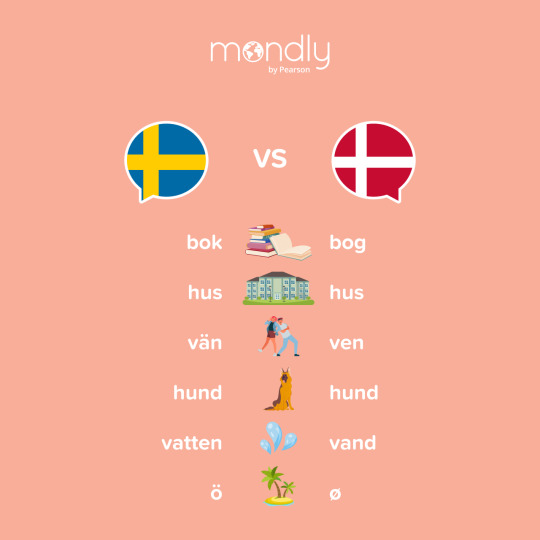
Swedish and Danish are like two peas in a pod. 👯
#mondly#languages#languagelearning#learnlanguages#swedish#danish#scandinavian#scandinavianlanguages#nordic#learnswedish#learndanish#vocabulary#swedishlanguage#danishlanguage
2 notes
·
View notes
Text
i have a date this afternoon
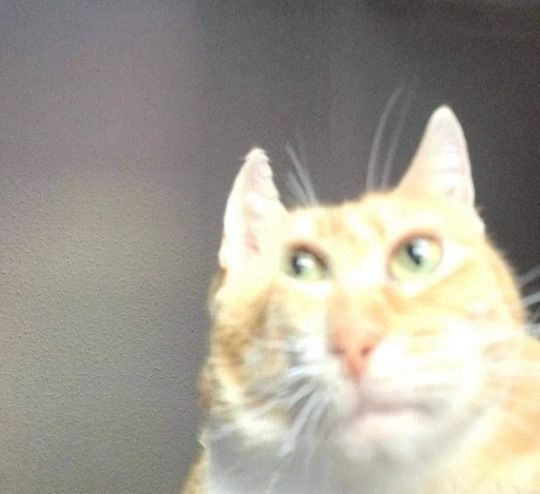
#with a danish academic#so im gonna feel so stupid considering my grammar and vocabulary goes whack in danish sometimes lol#good thing that it's friday so i can always get drunk this evening#:)))))
7 notes
·
View notes
Text
Duolingo Alternatives by Language
Disclaimer: I haven't used or tested all of them. All resources have different strengths, e.g. Drops being designed for vocabulary. They often aren't full alternatives for Duolingo or formal classes. I just wanted to compile resources for all languages on Duolingo to make the switch easier, especially for the less popular languages.
Feel free to also check out my collection of free textbooks
If you want a more detailed resource list for any of these languages (or perhaps one not listed here) you can send me an ask and I can see what I can do.
Arabic
AlifBee
Arabic Unlocked
Beelinguapp
Bluebird
Busuu
Clozemaster
Drops
Infinite Arabic
Ling
LinGo Play
LingQ
Mango
Mondly
Qlango
Write It! Arabic
Catalan
Bluebird
Clozemaster
Drops
Ling
LinGo Play
LingQ
LyricsTraining
Mondly
Qlango
Chinese
Bluebird
Beelinguapp
Bunpo
Busuu
Chineasy
Clozemaster
Drops
Du Chinese
Hello Chinese
HeyChina
Immersive Chinese
Infinite Chinese
Ling
Lingodeer
LinGo Play
Lingopie
LingQ
Mango
Mondly
Pleco Chinese Dictionary
Qlango
Czech
Bluebird
Clozemaster
Ling
LinGo Play
Mango
Mondly
Qlango
Danish
Babbel
Bluebird
Clozemaster
Drops
Ling
LinGo Play
Lingvist
LingQ
Mango
Mondly
Qlango
Dutch
Babbel
Bluebird
Busuu
Clozemaster
Drops
Ling
LinGo Play
Lingvist
LingQ
LyricsTraining
Mango
Mondly
Say Something in Dutch
Qlango
Esperanto
Clozemaster
Drops
Esperanto12.net
Kurso de Esperanto
LingQ
Qlango
Finnish
Bluebird
Clozemaster
Drops
Ling
LinGo Play
LingQ
LyricsTraining
Mango
Mondly
Qlango
French
Babbel
Bluebird
Beelinguapp
Bunpo
Busuu
Clozemaster
Collins French Dictionary
Conjuu
Dr French
Drops
HeyFrance
Infinite French
Lilata
Ling
Linga
Lingodeer
LinGo Play
Lingopie
Lingvist
LingQ
Listen Up
LyricsTraining
Mango
Mondly
Nextlingua
Oxford French Dictionary
Qlango
TV5MONDE
Xeropan
German
Babbel
Bluebird
Beelinguapp
Bunpo
Busuu
Clozemaster
Collins German Dictionary
Conjuu
Drops
DW Learn German
Infinite German
Ling
Linga
Lingodeer
Lingopie
LinGo Play
Lingvist
LingQ
LyricsTraining
Mango
Mondly
Nextlingua
Oxford German Dictionary
Qlango
Xeropan
Greek
Bluebird
Clozemaster
Drops
Greek Alphabet Academy
Ling
LinGo Play
LingQ
Mango
Mondly
Qlango
Write It! Greek
Guaraní
Clozemaster
Guarani Ayvu
Haitian Creole
Bluebird
Mango
Hawaiian
Drops
Mango
ʻŌlelo Online
Hebrew
Bluebird
Clozemaster
Drops
Ling
LinGo Play
LingQ
Mango
Mondly
Shepha
Write It! Hebrew
High Valyrian
Valyrian Dictionary
Hindi
Bhasha
Bluebird
Beelinguapp
Clozemaster
Drops
Hindwi Dictionary
Ling
LinGo Play
LingQ
Mango
Mondly
Qlango
Hungarian
Bluebird
Clozemaster
Drops
Ling
LinGo Play
LingQ
Mango
Mondly
Qlango
Indonesian
Babbel
Bluebird
Clozemaster
Drops
Ling
LinGo Play
LingQ
Mango
Mondly
Irish
Bluebird
Clozemaster
Collins Irish Dictionary
Drops
Easy Irish
Ling
Mango
Teanglann
Italian
Babbel
Beelinguapp
Bluebird
Bunpo
Busuu
Clozemaster
Collins Italian Dictionary
Conjuu
Drops
Infinite Italian
Ling
Linga
Lingodeer
Lingopie
LinGo Play
Lingvist
LingQ
LyricsTraining
Mango
Mondly
Nextlingua
Oxford Italian Dictionary
Qlango
Japanese
Beelinguapp
Bluebird
Bunpo
Busuu
Clozemaster
Drops
HeyJapan
Hiragana Quest
Infinite Japanese
kawaiiDungeon
Ling
Lingodeer
Lingopie
Lingvist
LingQ
LyricsTraining
Mango
Mondly
Oyomi Japanese Reader
renshuu
Takoboto Japanese Dictionary
Todaii
Qlango
Write It! Japanese
Klingon
boQwl! Klingon Language
Klingon Translator
Write It! Klingon
Korean
Beelinguapp
Bluebird
Bunpo
Busuu
Clozemaster
Drops
Hangul Quest
HeyKorea
Infinite Korean
Ling
LinGo Play
Lingopie
Lingodeer
Lingvist
LingQ
Mango
Mondly
Qlango
Write It! Korean
Latin
Bluebird
Cattus
Clozemaster
Collins Latin Dictionary
Grammaticus Maximus
Latinia
Legentibus
LingQ
Mango
Mondly
Perdisco
Qlango
Vice Verba
Navajo
Navajo Language Renaissance
Navajo Language Program
Speak Navajo
Norwegian
Babbel
Bluebird
Clozemaster
Drops
Ling
LinGo Play
Lingvist
LingQ
Mango
Mondly
Mjolnir Norwegian
Norskappen
Qlango
Polish
Babbel
Bluebird
Busuu
Clozemaster
Drops
Ling
LinGo Play
Lingvist
LingQ
LyricsTraining
Mango
Mondly
Qlango
Portuguese
Babbel
Beelinguapp
Bluebird
Bunpo
Busuu
Clozemaster
Collins Portuguese Dictionary
Drops
Infinite Portuguese
Ling
Lingodeer
Lingopie
LinGo Play
Lingvist
LingQ
LyricsTraining
Mango
Mondly
Nextlingua
Qlango
Romanian
Bluebird
Clozemaster
Drops
Ling
LinGo Play
LingQ
Mango
Mondly
Qlango
Russian
Babbel
Bluebird
Beelinguapp
Busuu
Clozemaster
Collins Russian Dictionary
Drops
Infinite Russian
Ling
Linga
LinGo Play
Lingopie
Lingodeer
Lingvist
LingQ
Mango
Mondly
Nextlingua
Qlango
Write It! Russian
Scottish Gaelic
Bluebird
Clozemaster
Go!Gaelic
Mango
Spanish
Babbel
Beelinguapp
Bluebird
Bunpo
Busuu
Clozemaster
Collins Spanish Dictionary
ConjuGato
Conjuu
Drops
Infinite Spanish
Ling
Linga
Lingodeer
LinGo Play
Lingvist
LingQ
Listen Up
LyricsTraining
Mango
Mondly
Nextlingua
Say Something in Spanish
SpanishDict
Qlango
Xeropan
Swahili
Bluebird
Bui Bui Swahili App
Clozemaster
Drops
Ling
LinGo Play
LingQ
Mango
Nkenne
Swedish
Babbel
Beelinguapp
Bluebird
Clozemaster
Drops
Ling
LinGo Play
Lingvist
LingQ
LyricsTraining
Mango
Mondly
Qlango
Turkish
Babbel
Beelinguapp
Bluebird
Busuu
Clozemaster
Drops
Ling
LinGo Play
LingQ
LyricsTraining
Mango
Mondly
Qlango
Ukrainian
Bluebird
Clozemaster
Drops
Ling
LinGo Play
LingQ
Mango
Mondly
Mova Ukrainian
Qlango
Speak Ukrainian
Vietnamese
Bluebird
Clozemaster
Collins Vietnamese Dictionary
Drops
Learn Vietnamese with Annie
Ling
Lingodeer
LinGo Play
Mango
Mondly
Welsh
BBc Cymru Fyw
Bluebird
Clozemaster
Say Something in Welsh
Yiddish
Bluebird
Clozemaster
Mango
Proste Yiddish
Roni Gal Learn Yiddish
Vaybertaytsh
Yiddish Book Center
Zulu
Bluebird
Nkenne
Bonus: Polygloss which claims to be available for all languages as long as there is another user also learning the same language
6K notes
·
View notes
Text

Baby I'm Yours ♡

( RE2r!Leon Kennedy x GN!reader || baking cookies but not getting much done because ur bf is very very sleepy || this rookie is trying his best ♡ re2r fluff for anon ♡ )


“Leon,” you chuckle, smiling as your eyes peer down at the bowl of batter he was supposed to be mixing. “You're mixing the air, not the bowl.” You point out, gesturing down to the bowl. He was still mixing the air, spoon not near the batter. Not by a long shot. Leon seemed out of it, head in the clouds all droopy eyed. Just what was he thinking about?
“Hey! Hey! Leon, I'm talking to you!” You say, waving your hand in his face. You knew working at the RPD was stressful, endless amounts of paperwork, and all that, but was it really that stressful enough to make Leon sleep while standing up? In the kitchen? Of all places?
Leon blinks, realizing your hand is in his face. “Oh shit, sorry.” He quickly apologizes, yawning softly. “The senior officers are just…too much for me.” He says, his focus on mixing the batter in the bowl in front of him. He sounded tired and looked tired, too, if it wasn't evident by the sleepy look in his eyes. “They're just peachy, aren't they? Been in the force too long?” You joke, trying to lift the mood.
“Don't worry your head, Scotty, they're just old geezers too long in office - probably rode dinosaurs or something to school.” You add as you shrug. Leon snickers, almost dropping the spoon he was holding in his hand.
“If Chief Irons heard ya you'd be dead meat, one of those stuffed animals he has in his room - it isn't the stuffed animal you're thinking of, by the way.” Your grimace at what Leon was implying, whatever it was, it didn't sound too pretty. “Oh god, do you mean..?” You trail off, looking at him with slightly wide eyes. Leon seems to brighten up, amused by your reaction. “Not the cute kind, definitely.” He chuckles, placing the mixing bowl to the side.
“The type you'd find in a museum. I don't know why he likes those things so much. He sure is peachy.” Just like you said, Leon agreed wholeheartedly. He didn't want to admit it, but he had a habit of soaking in whatever vocabulary you threw at him. Leon was regurgitating whatever you said in a sweetly, somewhat mimicking way. Like the way he quoted movies. Lucky you, even if you didn't notice it at all. Leon remembered the little things, or, at least, he tried.
“I finished mixing the batter…” He trails off, staring blankly at the bowl of dough like he was trying to see his own reflection in it. His blues gazed into the wheaty dough like he was trying to peer into a mirror. He, of course, couldn't. “What are we making again?” He asks as he peers into the bowl. He tilts his head. Maybe if he looked at it sideways, it'd make sense?
“Raspberry danishes, your favorite, remember?” You reply, taking the bowl from him. “Just sit pretty on the couch, okay bubba? You deserve a break.” You say, kissing his cheek. He looks up at you, eagerly nodding his head. Leon kind of wished he had a mirror now. He could feel his cheeks heating up as soon as your lips pulled away from his cheek. Bubba? That was new.
He glanced at the living room, then back at your face. You looked as though nothing had happened. As if you didn't just kiss him on the cheek.
Leon turns around, padding to the living room without saying a word. Besides a small mumbling ‘thank you’. He wasn't a monster, after all. He had manners.
He traces over where you kissed him, still the green behind-the-ears rookie he was back at the station. Even when it came to love. Especially when it came to loving you. You seemed to remember the little things, too.



#꒰͡ ♡ re2r leon ♡ ͡꒱ㅤ#₍⑅ᐢ..ᐢ₎ re2r!leon ily !! ♡#leon kennedy x you#leon kennedy x reader#leon kennedy x y/n#leon kennedy fluff#leon scott kennedy x reader#re fluff#re x reader#resident evil fluff#resident evil x reader#re2r leon#‧ ₊ ﹒ ୨ ♰ ୧ ﹒ ₊ ‧#dividers by pommecita
387 notes
·
View notes
Text
The Fantasy Language Translation Matrix
Whether you intend to write your own full-blown lexicon with different verb tenses and formal vs informal language, need unique words for spellwork, or just need new names for all your foreign places, behold… the Physalian patented Fantasy Language Translation Matrix.
(I kid. I have no idea if I’m the first to come up with this)
**Disclaimer!** After rolling out your fresh new vocab off the word assembly line, make sure you google it and that it doesn’t already exist and mean something you don’t intend.
Step 1: Pick your Derivative
You can make it sound completely foreign and like total gibberish, but I find it easier for you and other people to read if they have some real-world reference to compare it to, and so they have a clue for which pronunciation rules to rely on. For example: I did not know who René Descartes was my freshman year of high school. His last name was in my algebra book, and I, thinking he was Greek like so many other ancient mathematicians, pronounced his name as if he were Greek “Des-kart-ees.” I got made fun of.
Spare your readers the humiliation.
So say I want a vaguely… Russian/Latin/Italian influence. As opposed to French. Cool. That’s my starting point.
Step 2: Reorder the most common letters from English to your new language
In English, the average use of the standard alphabet by letter in order is this:
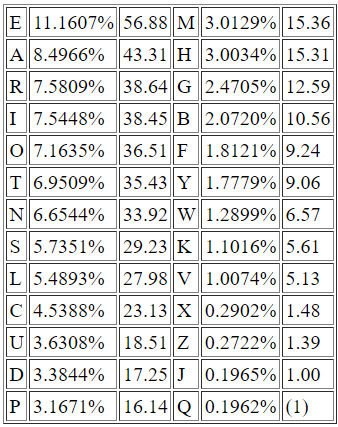
Ignore your vowels for a second. I don’t use charts like this on the regular, I use the Wheel of Fortune method and focus on RSTLNE, then go from there. I also want to make sure this isn’t a complete 1:1 ratio so it’s not super obvious I’m just juggling letters around, so I’ll knock out some “duplicate” letters and swap out singular letters for specific sounds.
The goal of this isn’t to stare at two existing language matrices and perfectly match them up, it’s to take the most common sounds and letters in English and make them new, common sounds in your new language, to sound more uniform and like you have a real etymology.
And I end up with this:

This might look a little confusing on how I got from A to Z so the basics:
All my vowels remain in the same place, they just get juggled around so I don’t end up with 8 consonants next to each other and word garbage
My “duplicate” letters are combined so I have more room for the new sounds, like c/k, f/ph/gh, h/wh, s/z. The new sounds then get the spare letters I had left over
Common english suffixes get reduced down so the pattern isn’t as obvious
If you want to include accent marks, this is your chance
I wanted to really emphasize the long “e” and long “i” sounds, so those got extra attention
Step 3: Translating
Oftentimes this is not perfect, or you end up with a word that just doesn’t fit the rest of your new vocabulary, because English is the bastard lovechild of German, Latin, Danish, and French.
I start with English, usually, but if the English word is too short or too long, I translate it first into another language, like Spanish, and go from there. Like “bus” vs “autobus”.
Using your matrix, go one by one. Let’s use a word like “letter”.
English: L-E-T-T-E-R
New: T-A-C-C-A-Z
Step 4: Polishing
So now I have my new word: “Taccaz”
Which is serviceable. I can throw an accent on either A or fiddle with the Z. I can start with “carta” instead and end up with “kizci”. The matrix is just a starting point. It’s designed to streamline the process when I’m otherwise feeling uncreative and in a rush, and it moves very quickly when I need to come up with full phrases and sentences that someone would actually say.
Step 5: Full sentences
This is only if you’re really digging deep and not coming up with the occasional fantasy curse word or new name for your fantasy land/realm/noun etc.
For this you’re going to need lots of tables. I based mine off romance languages because I know Spanish and romance languages make sense. This is where you decide how many pronouns, if any, you’re going to use, how the infinitive changes based on past, present, or future tense, how many nouns the word references, etc.
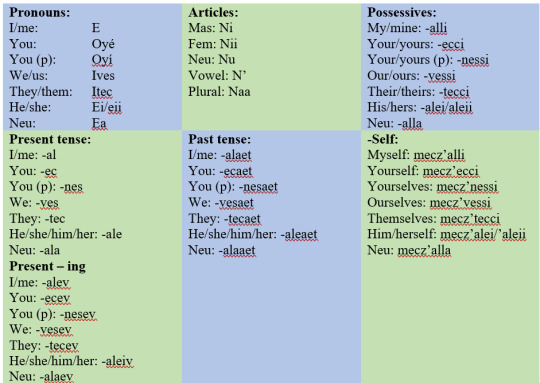
This is… a lot. Way more than you’d ever need for your manuscript. Ever. But I did it just for my own sake. Does it get long? Yes. Does it get tedious? Yes. The point here is to have little pre-manufactured word bytes you can plug and play with, with as little mental effort as possible so you can save it for the rest of your work.
I also came up with very common words already conjugated, like “to be” so I can just glance and type without having to remember to take “is” and go through the process over and over again.
Which means that I can take an entire sentence and translate it to my new language in about two minutes.
English: The payoff is worth it, this is so satisfying.
New, roughly: Nu kioyb ela fyzip ne, iski ela valo nicenbalaev.
Of course, you can keep tinkering until you get something that’s easier on the eyes (I’ve been working with this language for years so I can read it pretty well), but not all languages are smooth and pretty and simple.
To be frank: Most readers will just gloss over this stuff anyway, but it shows that you put in the effort and it enhances the lore and the immersion when you do this. At least in the written medium. You can’t ignore it if this is meant to be in a screenplay.
Is this what a language professor would do or recommend? Probably not, I have no idea. Does it work? Yes. I have a fully functioning grammatical system where any input can give me a legible output.
To make this yourself, just change the order of the letters around, adjust your shortcuts, and come up with your own common sounds for those last two rows. The conjugation matrix is where you can really make it distinct, assuming you are basing yours off a romance language, which you don't have to.
—
And there you have it!
Don’t forget to vote in the dialogue poll before it closes!
#writing resources#writing advice#writing tips#writing tools#writing a book#writing#writeblr#fantasy#sci fi#fictional language#language#world building
34 notes
·
View notes
Text
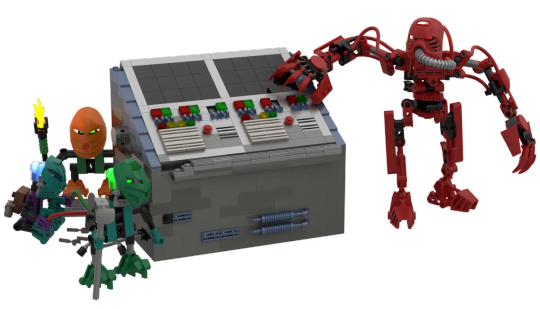
Mechanical lifeforms born of a technogenic jungle, Vaerkers are the inhabitants of Asynplex. Reaching to height of average Velhelt's knee, they lack their abilities or powers, but make up for it with numbers, scrappiness, and cunning - they need them, as a lone Vaerker will easily get lost in bowels of the gargantuan, ever-deteriorating machine. To survive in this world, Vaerkers need to work together - and their own Tool-Staves won't save them on their own.
Few Vaerker settlements exist - they are largely trade stops for nomadic bands that traverse the Asynplex. Most Vaerkers explore the mechanical depths and towers for a living, scavenging for materials and attempting to restore power to machinery that could provide manufacturing and recharging functions. When delving into the Robo-Innards, company of a Velhelt is an invaluable boon, as little robots are hardly march for the worst Asynplex can offer.
Rumors are the currency between Velhelts and Vaerkers - and now, Vaerkers speak of STOR- and DODELIG-class Masks of Power being stashed in vaults across Asynplex. Who will be foolhardy enough to see the truth for themselves?
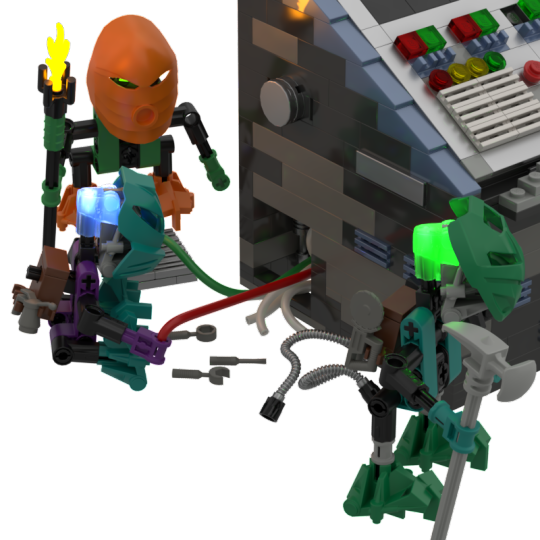
[More of creative exploration based on Bo Torstensen's concept art for Bionicle! The "Robo-Innards" artworks depict a Toa-like figure leading what looks very much like Turaga - not sure if Torstensen was aware of how Matoran will look like. Given that Matoran and Turaga were originally not supposed to be different "stages" of creature, exploring them in a different dynamic can be really fun - especially given that, without overt religious elements, they may view Toa quite differently.
As mentioned in prior post, the vocabulary is "inverted" - Māori, Hawai'i and Fiji terms are replaced with English, Danish, Old Norse ones. Feel free to offer suggestions!]
36 notes
·
View notes
Note
And another question re: Gaelic post…can you talk more about Scots, and how it came to be seen as the more “educated” language compared to Gaelic, as well as how the language is viewed now?
Barrie quaisten!
SCOTS
Scots is another Anglic language closely related to English. There is heated debate (often, unfortunately, along political party lines) over whether it should be considered a language or a dialect. However, the linguistic consensus is that Scots is indeed its own distinct language, complete with its own vocabulary, grammar rules, and historical character. It's akin to the relationship between Danish and Norwegian - while they share a relatively recent common ancestor and have influenced each other over the course of history (however lop-sided that influence may be), they are indeed separate languages.
Around the 600s CE, a new language appeared in the southeast corner of Scotland, back when this area was under the control of certain new-ish arrivals to the island who spoke a Germanic tongue. At this point, Middle Irish (modern Gaelic's immediate ancestor) was the court language of Scotland, and would remain so until the reign of David I, crowned in 1124. Scots is said to have begun diverging from the Northumbrian Old English dialect in earnest by the 1100s, although records of the language are sparse before about 1375 (the beginning of the Early Scots literary period) owing to Viking and English "meddling" (some light raiding here, some plundering there, general theft, and so on). Owing to its Northumbrian origin and heavier Scandinavian influence (stemming from close ties with the Danelaw), Scots has more of an Anglian and Norse character to it as opposed to its relatively more Saxon-y, Norman-y cousin to the south (i.e., English). Scots has also had much closer contact with languages like Scottish Gaelic and even Pictish and Cumbric (which I'll be sure to cover in a future post), and as a result has been influenced in its vocabulary and phonology.
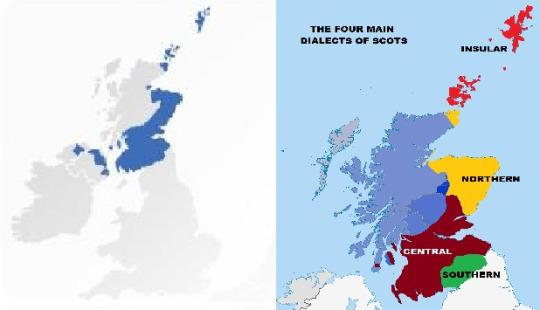
It has several dialects of its own, broadly categorized by location, ranging from Borders Scots to Orcadian Scots and everything in between. (And we can't forget Ulster Scots, a dialect brought to Ulster during the 1600s by Lowlander planters.) Due to this variation, modern Scots has no clear standardized form, though linguists have made several halfway-serious attempts over the past century or so to standardize orthography.
But what's been going on with Scots between David I and the present day? Let's dig in.
David I (in Gaelic, Daibhidh I mac Mhaoil Chaluim), who reigned from 1124 to 1153, initiated the proliferation of proto-urban societies across his kingdom. These societies were called "burghs", or "touns" in Scots, and they'll come in handy later. At about this same time, Norman French began to infiltrate the Scottish nobility, and Gaelic began to decline as a language of prestige among higher levels of society.
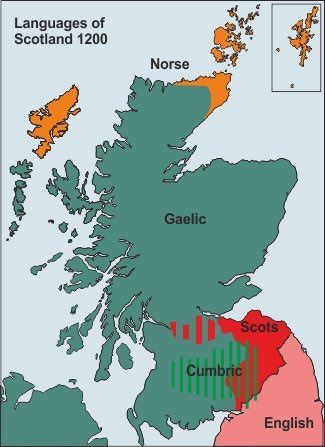
Once the 1200s started to creep around, the northern dialect of Early Middle English that would become Scots began expanding ever northward towards the Forth-Clyde line. This dialect was called "Inglis" by its speakers, and over the next century, it began to supplant Norman French and Gaelic as a common language within the burghs. The 1300s saw this "Inglis" tongue grow in prestige and it began to eclipse Norman French at even the higher levels of society, particularly within the courts. As the 1400s approached, it even began to replace Latin as the language of ecclesiastical and royal court proceedings.
The 1400s saw a relatively rapid geographic spread of Scots at the expense of Gaelic, which was cornered into the Highlands, Western Isles, and small pockets in the Lowlands (viz. Galloway, where Gaelic survived at least up to 1760). By the early 1500s, Scots began to be known as "Scottis", and Gaelic, which had previously been referred to thus, was now being dubbed "Erse" ("Irish") in attempts to otherize Gaelic. The 1500s saw the advent of Middle Scots, which was, in my amateur opinion, the golden era of the language, owing to its undisputed support at all levels of society across most of the kingdom. Around this time, a loose written standard did exist, but the language was still written how it sounded and regional variation was commonplace.

1567, however, saw the coronation of James VI of Scotland (note: James I of England and Ireland as well from 1603 on). His famous Bible translation (KJV) helped to set in motion the gradual Anglicization of Scottish society as it was dispersed among the population. In 1603, the Union of the Crowns brought Scots-speaking and English-speaking nobles into closer contact, and English gradually began to dominate the speech of the Scottish nobility (this exchange would produce what is now Scottish English, a distinct standardized dialect of English that some argue is one end of a linguistic spectrum, at the other end being "braid Scots").
Beginning in 1610 and continuing through to the 1690s, Scottish planters from across the western Lowlands and the Borders began to settle in Ulster, the northeastern region of Ireland. Over time, this group of people would come to develop their own regional identity, the Ulster Scots (or, often in a New World context, Scots-Irish). Their local dialect of Scots, while maintaining a Lowland character, picked up various influences from Hiberno-English (particularly in phonology) and from the Irish language (various contributions of vocabulary).

By about 1700, written Scots, at least in an official capacity, had become almost completely Anglicized. An example of an Anglicized convention introduced to Scots writing is the "apologetic apostrophe", an apostrophe that was inserted into a Scots word where an English-speaking person might expect a letter to be (for example, the Scots word "wi" (in English, "with") would have been written wi'). In 1707, the Acts of Union (Note: Panama played a role) seemed to solidify a shift in the upper-class opinion of the Scots language - what scarcely 150 years before was seen as the national language was now looked down upon by the nobility as "uneducated speech" or "bad English".
However, things looked different from a lower- and middle-class perspective. Contrary to high society, the common people began to take a renewed interest in the Scots language, and a literary revival began. This mid-1700s revival gave us such world-famous names as Robert Burns, Walter Scott, and Thomas Campbell. It was at this time that Scots transitioned from Middle to Modern Scots. However, features such as the apologetic apostrophe were retained during this period to gain wider readership among an English-speaking audience, a market that now effectively spanned the globe. (Meanwhile, the Highlands and Lowlands each experienced their own set of Clearances, and Scotland's diaspora began their journey to the edges of the empire.)
By the early 1800s, this "Scots fever" (NOTE: not a technical term) had reached the upper classes of society as they increasingly turned a Romanticist eye to the literature of their homeland, while simultaneously keeping Gaelic at arm's length. Since this point, there hasn't been any sort of top-level, government-sanctioned, institutional spelling reform or rulebook published on Scots orthography, although this hasn't stopped a wealth of Scots poetry and prose from being published through the years.
Since this era, there has been a relatively steady stream of interest in the language, though recent government initiatives have been taken to attempt to ensure the survival of, and increase interest in, Scots. This 2010 study by the Scottish Government sheds some light on modern public perception of the language within Scotland itself.
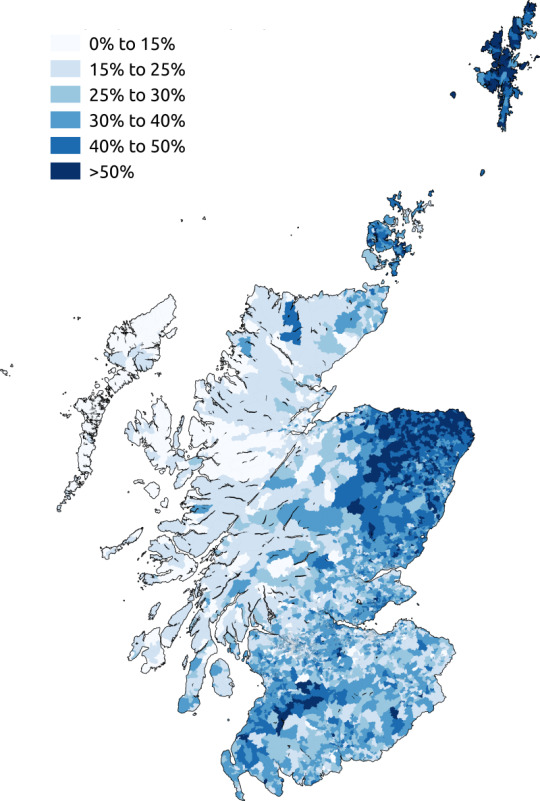
Over in Northern Ireland, the Ulster-Scots Agency was established as part of the wider Belfast Agreement of 1998 in efforts to promote the language and wider culture.
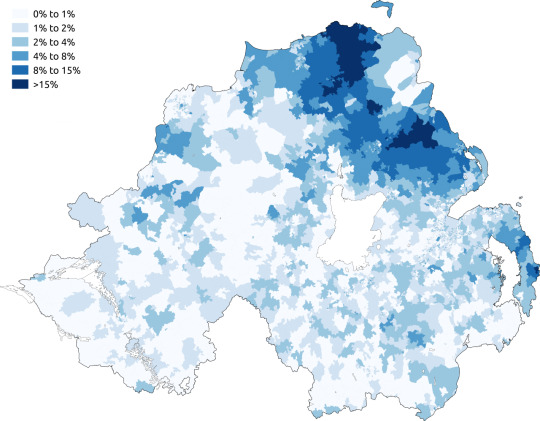
It's not all roses these days, however. A couple of years ago, it came to light that a North Carolina teenager had been, for over seven years, writing entries on the Scots Wikipedia, without any knowledge of the language. One Reddit user remarked that this teenager had caused "more damage to the Scots language than anyone else in history." (Perhaps take this with a grain of salt.)
Would you like to help protect the language?
The best way to protect a language is to learn it! If you click that link, there are several resources for adult learners of Scots to start their journey. My perennial advice, though: once you've got the basics down, use it! Find a Scots speaker and stumble your way through a conversation. Don't be afraid of making mistakes! (Note: everyone makes them.) One resource I've used in the past to learn some basics is the Open University's (entirely free!) Scots language and culture online course. All you need to do is sign up and work through the modules!
Follow for more linguistics and share this post! If you have any questions, feel free to ask!
#scots#scotland#germanic#language#languages#learning languages#langblog#langblr#indo european#united kingdom#ireland#northern ireland#ulster
214 notes
·
View notes
Text
How to articulate your emotions in Danish
WARNING: LONG POST AHEAD
Literal years ago, I got an ask about how to talk about emotions in Danish. I was never really entirely sure, what the person was asking about, but I recently had the idea to just flat out translate one of those "how to identify which emotion you're experiencing" charts. So here goes nothing
Please note: all of these are approximations, and a lot of the words that are used to describe the same general feeling are in fact more or less interchangeable, as is the case with the emotion chart.
This is the chart I used:

[ID in alt text]
bange - fearful
noun: frygt - fear
bange, frygtsom, ræd - scared
hjælpeløs - helpless
skræmt, rædselsslagen - frightened
nervøs, ængstelig - anxious
overvældet - overwhelmed
bekymret - worried
usikker - insecure
utilstrækkelig - inadequate
underlegen, mindreværdig - inferior
svag - weak
værdiløs - worthless
ubetydelig, betydningsløs - insignificant
afvist - rejected
holdt udenfor, ekskluderet - excluded
forfulgt - persecuted
truet - threatened
nervøs - nervous
udsat - exposed
sur - angry
noun: vrede - anger
skuffet, svigtet - let down
forrådt - betrayed
forurettet - resentful
ydmyget - humiliated
ikke føle sig respekteret - feel disrespected
gjort nar ad, latterliggjort - ridiculed
bitter - bitter
forarget - indignant
krænket - violated
vred - mad
rasende - furious
jaloux - jealous
aggressiv - aggressive
provokeret - provoked
hostile - fjendtlig
frustreret - frustrated
arrig - infuriated
irriteret - annoyed
fjern - distant
tilbagetrukken/tilbagetrukket - withdrawn
følelsesløs, følelsesforladt - numb
kritisk - critical
skeptisk - sceptical
affejende, afvisende - dismissive
frastødt - disgusted
noun: afsky - disgust
misbilligende - disapproving
fordømmende - judgemental
pinligt berørt - embarrassed
skuffet - disappointed
forfærdet - appalled
væmmes (verb, reflexive) - to be revolted
e.g. jeg væmmes ved lugten af fisk 'I am revolted by the smell of fish'
frygtelig - awful
kvalm - nauseated
foragtelig - detestable
frastødt - repelled
forfærdet - horrified
tøvende - hesitant
ked af det - sad
noun: bedrøvelse, sorg - sadness, sorrow
såret - hurt
flov - embarrassed
skuffet - disappointed
deprimeret*, nedtryk - depressed
mindreværdig - inferior
tom, følelsesforladt - empty
*while deprimeret like English depressed primarily should be used in relation to a medical diagnosis of depression, it is also used as a synonym of nedtrykt (literally ned 'down, de' + trykt 'pressed') in the vernacular
skyldig - guilty
fortrydende, skyldbetynget, angerfuld - remorseful
skamfuld - ashamed
fortvivlelse - despair
adj: fortvivlet - despairing
sorg - grief
adj: sorgfuld, sorgramt, sørgende - grief-stricken, grieving
magtesløs - powerless
sårbar - vulnerable
gjort til offer, offergjort - victimised
skrøbelig - fragile
ensom - lonely
isoleret - isolated
efterladt - abandoned
glad - happy
noun: glæde, lykke - happiness
legesyg, legende - playful
ophidset - aroused
fræk - cheeky
tilfreds - content
fri - free
lykkelig, glad - joyful
interesseret - interested
nysgerrig - curious
videbegærlig - inquisitive
stolt - proud
succesfuld, succesrig - succesful
selvsikker - confident
accepteret - accepted
respekteret - respected
værdsat - valued
stærk, magtfuld - powerful
modig - courageous
kreativ - creative
fredfyldt - peaceful
kærlig - loving
taknemmelig - thankful
tillidsfuld - trusting
følsom, sensitiv - sensitiv
intim, tæt - intimate
optimistisk - optimistic
håbefuld - hopeful
inspireret - inspired
overrasket - surprised
noun: overraskelse - surprise
forskrækket - startled
chokeret - shocked
forfærdet - dismayed
forvirret - confused
desillusioneret - disillusioned
perpleks - perplexed
forbløffet - amazed
forbavset - astonished
ærefrygt - awe
begejstret, spændt - excited
ivrig - eager
energisk - energetic
dårligt - bad
kede sig (verb, reflexive) - to be bored
e.g. jeg keder mig 'I am bored'
ligeglad - indifferent
apatisk - apathetic
travl - busy
presset - pressured
forhastet - rushed
stresset - stressed
overvældet - overwhelmed
ude af kontrol - out of control
træt - tired
søvnig - sleepy
ufokuseret - unfocussed
#danish#danish language#danish langblr#emotions#langblr#tongueblr#vocab list#vocabulary list#danish vocabulary#original#this is a little rushed (hæhæ) because i saw this chart and then blacked out and spent two hours on this#and am posting it without proof reading#but fuck it amirite lads
21 notes
·
View notes
Note
Language fact about norwegian written language
Norway has two recognized written languages used for communicating in norwegian, nynorsk and bokmål!
This is because prior to the 1800s, Norway didn't have any written language apart from danish and after gaining independace from Denmark, norwegians wanted to develop our own language, but we were divided in regards to how to go about it.
Bokmål is the most common written language and is a "norwegification" (or "fornorskning" in norwegian) of danish, whilst nynorsk is based on the spoken dialects in different parts of Norway!
It's obligatory for students that write in bokmål (I am personally not sure about how it is for students that write in nynorsk, I myself have bokmål as a written language so this is my personal experience), learning how to write and read in nynorsk is an obligatory part of norwegian class in school, but since nynorsk and bokmål are somewhat different in regards to vocabulary, there is as big struggle to understand what is said half the time and a lot of use of translating programs are used lol.
Nice language fact!! Thank you!! I legit didn't know
wikipedia for those interested
15 notes
·
View notes
Note
8, 9, 10 :)
8 - How many languages do you know?
German, English, a bit Danish and I took a French language course in school. Unfortunately I forgot many words. ._. But I still know a bunch of grammar rules for French. I really love the French language. Back in the days I was too lazy to learn the vocabulary tho.
9 - What's your all time favourite movie/tv show?
TV Show: Avatar - The Last Airbender

Movie: The Green Mile

10 - What are you enjoying to do in your free time?
I'm a nerd. Thus I spend most of my time playing video games. I also love roleplaying as this gives me the possibility to be someone else and escape from my own state of mind.
Thank you for your questions - I appreciate it! :)
4 notes
·
View notes
Text
(Re)introduction post
I seem to be gaining a lot of new followers atm (migrants from langtwt, I’m guessing! In that case: hello and welcome to langblr!) SO here’s a little bit about me and my blog!
About Me
I mostly go by Victoria online and it's what I prefer
She/her
In my 30s (yes I am a Real Adult with at least some of my shit figured out)
UK born and raised (East Midlands), although I'm moving to Japan soon!
I currently teach English as a foreign language on italki to students of all ages (current age range is something like 5-60), but will be teaching at an Eikaiwa from January
I'm also an aerialist (pole and hoop), which I teach and perform, a stilt-walker and fire performer (you can go visit my sideblog @jo-jenova if you're interested)
I'm also a fan of gymnastics, dance, writing (fantasy/sci fi/general fiction), baking, buying and owning books (and occasionally reading them), vikings (not in a weird white supremacist way), corvids, cats, Star Trek and, of course, linguistics
I’m currently awaiting an ADHD and autism assessment. I’m 99.9% sure I have ADHD and have pretty much no doubts that I’ll get a diagnosis (autism I’m less convinced of, but we’ll see what the experts say)
Languages
My native language is English (British - close to modern RP)
I also speak Norwegian and it is my main love/target language. This year I took the official B2/C1 exams and got C1. I write bokmål and speak a variety of Oslo dialect.
I'm also learning Japanese (current level: not quite N5). My goal is to reach a comfortable N5 level before I go there.
I largely understand Scots (more written than spoken), Danish (more written than spoken) and Swedish.
Languages I love and have some experience with but am not learning right now include: Finnish, Icelandic, Ukrainian, Tswana, Spanish
Wishlist: Korean, Cornish, Irish, Old Norse, Old English, Chinese
I can speak/understand a bit of French because I learned it for like 12 years but I've forgotten most of it (I do appear to be dabbling in it a little again though whoops lol)
I post primarily about Norwegian, Japanese, other Nordic languages, Celtic languages (Scots included as an honorary member) and linguistics, but occasionally I'll post about other things too.
About My Blog
My blog focuses primarily on my own personal language journey. I'm not really about aesthetics (you might get an aesthetic picture once in a blue moon) or pretending to be more advanced than I am. I mostly try to reflect where I am.
Sometimes this means I come across as bragging when I’m proud of myself or attention-seeking when I’m feeling down. That’s not my intention; I mostly just aim to be honest with myself and everyone else.
I post language logs once a week. These are so I can keep a track of what I've been doing and how I feel from week-to-week. They're not to show off how much I did or make anyone feel like they should be doing more. But if they make you feel that way and need to unfollow me because of that, then I understand.
Other things I post may include vocabulary lists, grammar posts, things related to linguistics, challenges and links to things related to my target languages that I find interesting.
I don’t do drama or discourse. I feel no obligation to respond to inflammatory asks and usually delete anything that I think is contentious. This is a language blog and it’s pretty rare that I deviate from that (I have a side blog for all my non-languagey stuff). But of course you can ask me questions about me and my life!
My blog is absolutely a safe space for people from all walks of life regardless of sexual identity, gender identity, ethnicity, nationality, colour, religion, size, IQ, background etc. If you consider that to be an issue, then you know where the unfollow button is.
I’m kinda terrible at replying to messages, so please don’t take it personally if I never respond to you.
My ask box is always open and anon is always on, so please feel free to send me any questions you have! (But uhh like I say I’m bad at replying sometimes so please just give me a nudge because honestly I may have just forgotten)
66 notes
·
View notes
Text
My favourite language learning app for building vocabulary.
Drops has helped me to build my irish vocabulary because of the extensive catagories to choose from i can learn what I want to learn. I also find it helpful because in the free version you can only do five minutes a day. I find that for me it keeps me motivated and makes me pay more attention to the words as occasionally you will have to spell them. I personally find the app helpful for adding vocabulary to my knowledge but it does lack grammar and actual sentences.
Theres many different languages on drops and these are:
ainu, arabic, ASL, bosnian, catalan, chinese (cantonese), chinese (mandarin), croatian, danish, dutch, british and american english,
Esperanto, estonian, finnish, french, galician, german, greek, hawaiian, hindi,
hungarian, icelandic, igbo, indonesian, irish, italian, japanese, korean, norweigan,
persian, polish, brazilian portugues, european portugues, romanian, russian,
samoan, sanskrit, serbian, european spanish, mexican spanish, swahili,
swedish, tagalog, te reo maōri, thai, turkish, ukrainian, vietnamese, yoruba
#irish#gaeilge#languages#te reo maori#hungarian#japanese#korean#chinese#mandarin#cantonese#greek#german#deutsch#finnish#swedish#icelandic#norwegian#danish#dutch#catalan#galician#bosnian#russian#ukrainian#serbian#indonesian#vietnamese#portuguese#italian#hindi
14 notes
·
View notes
Text
I think it’s actually like, extremely important that textbooks written for the use of class/teaching get read/edited by someone with a degree in the relevant language. And vice versa that language textbooks get proofread by an idiot.
My textbook for Danish? Well formulated, expertly written grammar and vocabulary, HOWEVER not only victim but a hostage to the authors need to be the smartest person in the room.
My textbook for history? The facts are laid out in detail with sources and citations, wastes no time getting to the point ALSO. 50 THOUSAND spelling errors, strange layout, by god this book looks like it was written by a drunk wizard
6 notes
·
View notes